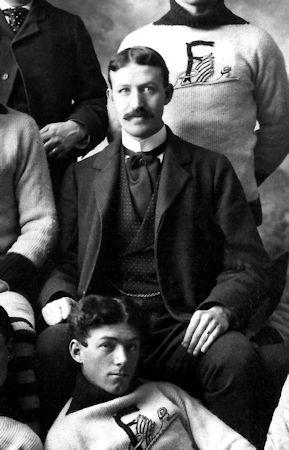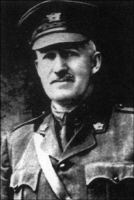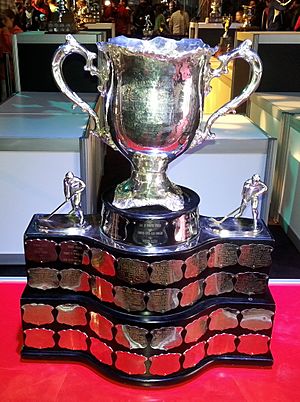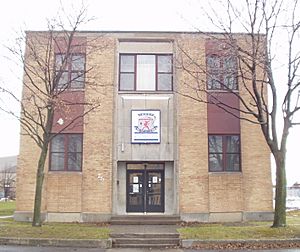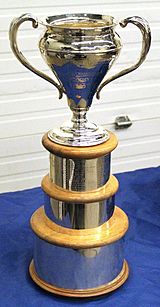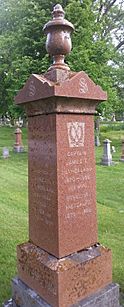James T. Sutherland facts for kids
Quick facts for kids
Captain
James T. Sutherland
|
|
|---|---|
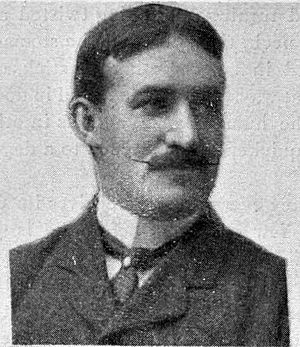 |
|
| Born | October 10, 1870 Kingston, Ontario, Canada
|
| Died | September 16, 1955 (aged 84) Kingston, Ontario, Canada
|
| Resting place | Cataraqui Cemetery |
| Nationality | Canadian |
| Occupation | Soldier & salesman |
| Organization | OHA & CAHA |
| Known for |
|
| Military career | |
| Allegiance | |
| Service/ |
Canadian Expeditionary Force |
| Years of service | 1887–1904, 1916–1918 |
| Rank | Captain |
| Battles/wars | World War I |
James Thomas Sutherland (October 10, 1870 – September 16, 1955) was a very important person in Canadian ice hockey. Many call him the "Father of Hockey." He helped create and grow the game across Canada and into the United States.
Sutherland played in the first season of the Ontario Hockey Association (OHA). He also coached and refereed games. He started the first Kingston Frontenacs team. Later, he became the president of both the OHA and the Canadian Amateur Hockey Association (CAHA). He also helped create the Memorial Cup in 1919.
He was a soldier and a salesman. He served as a Captain in the Canadian Expeditionary Force during World War I. Sutherland worked hard to create the Hockey Hall of Fame. He believed Kingston was where hockey began. This belief helped Kingston become the first home of the Hockey Hall of Fame. He was one of the first people inducted into the Hall of Fame.
Contents
Early Life and Hockey Beginnings
James Thomas Sutherland was born in Kingston, Ontario, on October 10, 1870. He was the youngest of eight children. His family had roots in Scotland and Ireland. They owned a shoe business that made boots for soldiers.
When he was 15, Sutherland tried to join the military like his father. He wanted to serve in the North-West Rebellion but was too young. Two years later, in 1887, he joined Kingston's 14th Regiment. He also worked as a bookkeeper.
Sutherland grew up playing hockey on the frozen Cataraqui River in Kingston. He saw the first recorded hockey game in Canada. This game was on March 10, 1886, between Queen's University and the Royal Military College of Canada.
Sutherland was one of hockey's first team captains. He played as a defenceman for the Athletic Club of Kingston. This was during the first season of the Ontario Hockey Association in 1890–91.
In 1897, Sutherland married Ethel Mary Metcalfe. He helped start the Frontenac Hockey Club of Kingston. He stopped playing but stayed involved as a referee, timekeeper, manager, and coach.
Sutherland coached the Frontenac team that won OHA junior championships in 1910 and 1911. Future Hall of Famers Scotty Davidson and George Richardson were on this team. In 1911, he joined the OHA executive. He helped change rules, like allowing player substitutions. He also helped change game periods from two thirty-minute periods to three twenty-minute periods.
Leading During Wartime
Sutherland became president of the Ontario Hockey Association in 1915. He was then elected president of the Canadian Amateur Hockey Association (CAHA) in December 1915. In 1916, he joined the World War I effort. He enlisted with the Royal Canadian Army Service Corps.
I feel that I have a greater responsibility and duty to perform at this time and that is to point out to the great army of hockey players and officials scattered throughout our beloved Canada, how great and urgent the need is for men to come forward and rally to the defence of our common cause and strike a blow for liberty and justice. It takes nerves and gameness to play the game of hockey. The same qualities are necessary in the greater game that is now being played in France and on the other fighting fronts." "With every man doing his bit, Canada will raise an army of brain and brawn from our hockey enthusiasts the likes of which the world has never seen. The whistle has sounded. Let every man play the greatest game of his life.
Sutherland encouraged Canadian hockey players to join the war. He used his position with the CAHA to send a message across the country. He compared the teamwork in hockey to fighting for a common cause in war.
Sutherland went to Europe in 1916 as a Captain. He returned to Canada in 1918 after the war ended. He then continued his work with the CAHA and the Frontenacs.
After the War and the Memorial Cup
Sutherland remained CAHA president until 1919. He was known for his knowledge of hockey history. He also introduced preseason exercises and a coaching system.
He wanted to create a trophy to honor soldiers who died in World War I. Many of these soldiers were junior hockey players. They had answered Sutherland's call to join the war. The deaths of two former Frontenacs players, Scotty Davidson and George Richardson, inspired him.
Sutherland and businessman Liam Carr bought a trophy. The Ontario Hockey Association donated it. This trophy became the Memorial Cup. It was first given out in 1919 to Canada's best junior hockey team.
Sutherland continued to be a long-time member of the OHA executive committee. He suggested rule changes to make the game safer for players. He also supported banning bodychecking in junior hockey. He believed in keeping amateur hockey truly amateur, without paid coaches or players with professional contracts.
The Birthplace of Hockey Debate
Historians are said to differ considerably on the place in which the great Caesar first saw "the light of day," and similarly in respect to the birthplace of Canada's national winter sport, Hockey. There may be some who will claim sundry and divers places as being the authentic spot or locality. Whatever measure of merit the claim of other places may have, I think it is generally admitted and has been substantially proven on many former occasions that the actual birthplace of organized hockey is the city of Kingston, in the year 1888 (actually 1886). The first actual game that we have any record of occurred in Capt. Dix's rink, which was located on the harbour in front of the city buildings, Kingston. This game was played between teams representing Queen's University and the Royal Military College.
Sutherland spent much of his later life trying to prove that Kingston was the birthplace of hockey. He wanted Kingston to get credit for its early role in the game. He wrote articles in 1924, 1925, and 1928, arguing for Kingston.
Other places in Canada, like Montreal and cities in Nova Scotia, also claimed to be hockey's birthplace. Sutherland's claim was based on a game played in Kingston Harbour in 1855. This was even earlier than the 1886 game he witnessed.
In 1943, the Canadian Amateur Hockey Association agreed with Sutherland that Kingston was the birthplace. However, later research showed that Kingston did not have the first hockey league. The Amateur Hockey Association of Canada was formed earlier in Montreal in 1886. Still, experts agree that Kingston, Sutherland, and the OHA were very important. They helped hockey grow from Montreal westward into Ontario and south into the United States.
Creating the Hockey Hall of Fame
The National Hockey League (NHL) supported building a Hockey Hall of Fame in Kingston in 1943. The CAHA also agreed. Sutherland started a local committee to plan the Hall of Fame. He raised money and convinced the CAHA and NHL to help. The first members were inducted in 1945.
Sutherland wanted the Hall of Fame to "remember the men who have done so much to develop Canada's great winter sport." The Hall was first planned for Kingston City Hall. Later, it was expected to be part of a new arena.
Sutherland donated $1,000 of his own money. He also raised more funds. But fundraising was slow due to World War II. There were also disagreements with the NHL about the location and high building costs.
By 1955, the NHL decided to support a Hall of Fame in Toronto instead. Despite this, the Kingston committee continued with their plan. They used the money and items they had collected to build an International Hockey Hall of Fame in Kingston.
Death and Lasting Impact
James T. Sutherland passed away on September 16, 1955. His wife died nine days later. They were buried at Cataraqui Cemetery in Kingston. Their gravestone has crossed hockey sticks, which was the original logo of the Hockey Hall of Fame.
Sutherland received many honors for his work. He became a life member of the CAHA in 1928 and the OHA in 1931. The Sutherland Cup was named after him in 1934. It is awarded to the Junior B champions of the OHA.
In 1945, Sutherland was one of the first people inducted into the Hockey Hall of Fame. He was recognized as a "builder" of the game. He was also inducted into the International Hockey Hall of Fame in 1947.
The Hockey Hall of Fame he helped start finally opened in Toronto in 1961. The Kingston Hall of Fame opened in 1965. Sutherland's large collection of hockey items was given to the International Hockey Hall of Fame. A hall there is named after him.
Sutherland's life and work are remembered in books. These include Captain James T. Sutherland: The Grand Old Man of Hockey & The Battle for the Original Hockey Hall of Fame by Bill Fitsell.
 | Aaron Henry |
 | T. R. M. Howard |
 | Jesse Jackson |


